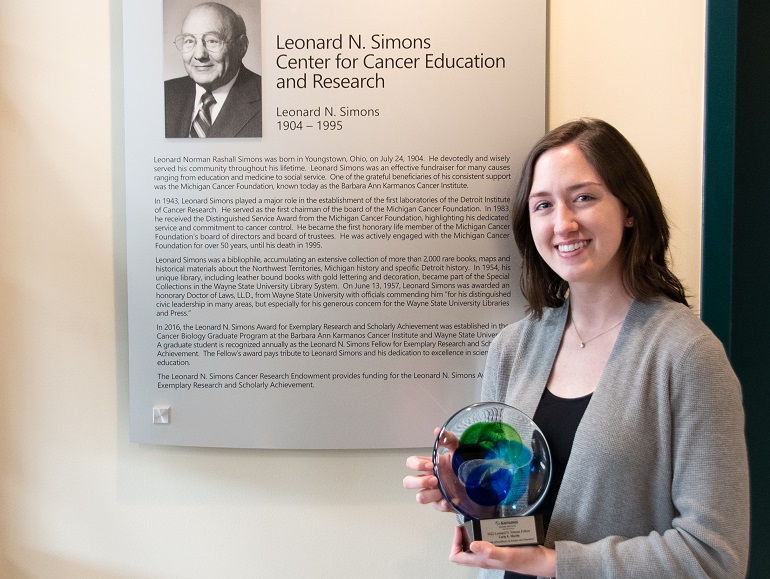
The Wayne State University School of Medicine and Barbara Ann Karmanos Cancer Institute’s Cancer Biology Graduate Program presented its 11th annual Research Symposium virtually April 1.
The tradition began in 2011 when the Cancer Biology Graduate Program found a permanent departmental home in the Department of Oncology. The symposium is an opportunity for doctoral and M.D./Ph.D. trainees in the program to showcase their research and to network with faculty.
“I never cease to be impressed by the high-quality science our trainees are doing,” said Cancer Biology Graduate Program Director and Professor of Pharmacology Larry Matherly, Ph.D. “This year's symposium is the second time the event has been virtual, so several of our trainees have never given an in-person presentation on their research. With this said, they have stayed the course and not missed a beat. They are outstanding students who have a bright future.”
Dr. Matherly kicked off the event, which included remarks by doctoral students Agnes Malysa and Rayane Dennaoui, who worked closely with Dr. Matherly and Cancer Biology Graduate Program Manager Nadia Daniel to organize the symposium.
“At the time we were finalizing the plans, the Omicron cases were still high and it was agreed that the prudent plan this year would be once again to have the event done virtually. We are hopeful that going forward next year's event will be in person and include both oral presentations and posters,” Dr. Matherly added.
The Leonard N. Simons Award for Exemplary Research and Scholarly Achievement is awarded at the annual event to a Cancer Biology student who has distinguished him- or herself in scholarship and leadership. In 2016, the award was established in the Cancer Biology Graduate Program at Karmanos and WSU. Simons served as the first chair of the board of Michigan Cancer Foundation (now the Karmanos Cancer Institute) and throughout his life was a passionate supporter of Detroit’s efforts in the fight against cancer. The award pays tribute to Simons and his dedication to excellence in science and education. The Leonard N. Simons Cancer Research Endowment provides funding for the Leonard N. Simons Award for Exemplary Research and Scholarly Achievement.
This year’s Simons Award went to Carly Martin, a senior student who defended her dissertation, “Characterizing the post-translational modifications of the pro-oncogenic type II transmembrane serine protease TMPRSS13,” on March 3.
Martin grew up in Berkley, Mich., and joined the Cancer Biology Graduate Program in the fall of 2017. She trained under the guidance of Professor of Pharmacology Karin List, Ph.D., and studies an enzyme or protease named TMPRSS13. The protease digests proteins that are essential for progression of breast and colorectal cancers. She has shown that TMPRSS13 can be structurally modified in a manner that impacts its function, its location in cancer cells, and potentially its relationship to other cancer-associated proteins. Better understanding of these processes could lead to new therapies for breast and colorectal cancers.
The symposium’s keynote speaker was alumna Sidra Ahsan, Ph.D., who received her doctoral degree in Cancer Biology from the School of Medicine in 2015. In 2016, Dr. Ahsan joined the National Cancer Institute Technology Transfer Center, where she serves as a senior technology transfer manager.
This year’s symposium included 21 oral presentations from Cancer Biology students. The top presenters were:
First: Mathew Schneider, for “Extracellular Folate and Transporter Levels Impact the Compartmentalization of the One-Carbon Metabolic Pathway in the Mitochondria and Cytosol.”
Second: Sahar Bannoura, for “Unveiling the Role of Regulator of Chromosome Condensation 1 (RCC1) in Pancreatic Cancer.”
Third: Artem Berezovsky, for “Glioblastoma Hijack Functions of Neurons and Muscle Cells Following the loss of Extrachromosomal DNA Amplified Oncogenes.”
Fourth: Carly Martin, for “Characterizing the Post-Translational Modifications of the Pro-Oncogenic Type II Transmembrane Serine Protease TMPRSS13.”